Strategic IHRM in Global Organizations: Unilever Case Study MHR011
VerifiedAdded on 2023/06/18
|11
|2653
|278
Report
AI Summary
This report explores international human resource management (IHRM) within multinational enterprises, focusing on Unilever's global operations. It distinguishes between multinational and transnational enterprises, detailing the differences between domestic and international HRM. The report examines various staffing approaches, including ethnocentric, polycentric, regiocentric, and geocentric models, highlighting the advantages and disadvantages of each. It discusses the importance of understanding national culture and legal frameworks, particularly in the UK and Germany, and outlines key factors for hiring international assignees and identifying talent in host countries. Recommendations are provided for evaluating policies related to expatriate employee repatriation and addressing equality concerns across different countries. The report emphasizes the need for cultural training and legal compliance to ensure successful international business operations. Desklib offers a wealth of similar solved assignments and past papers for students.
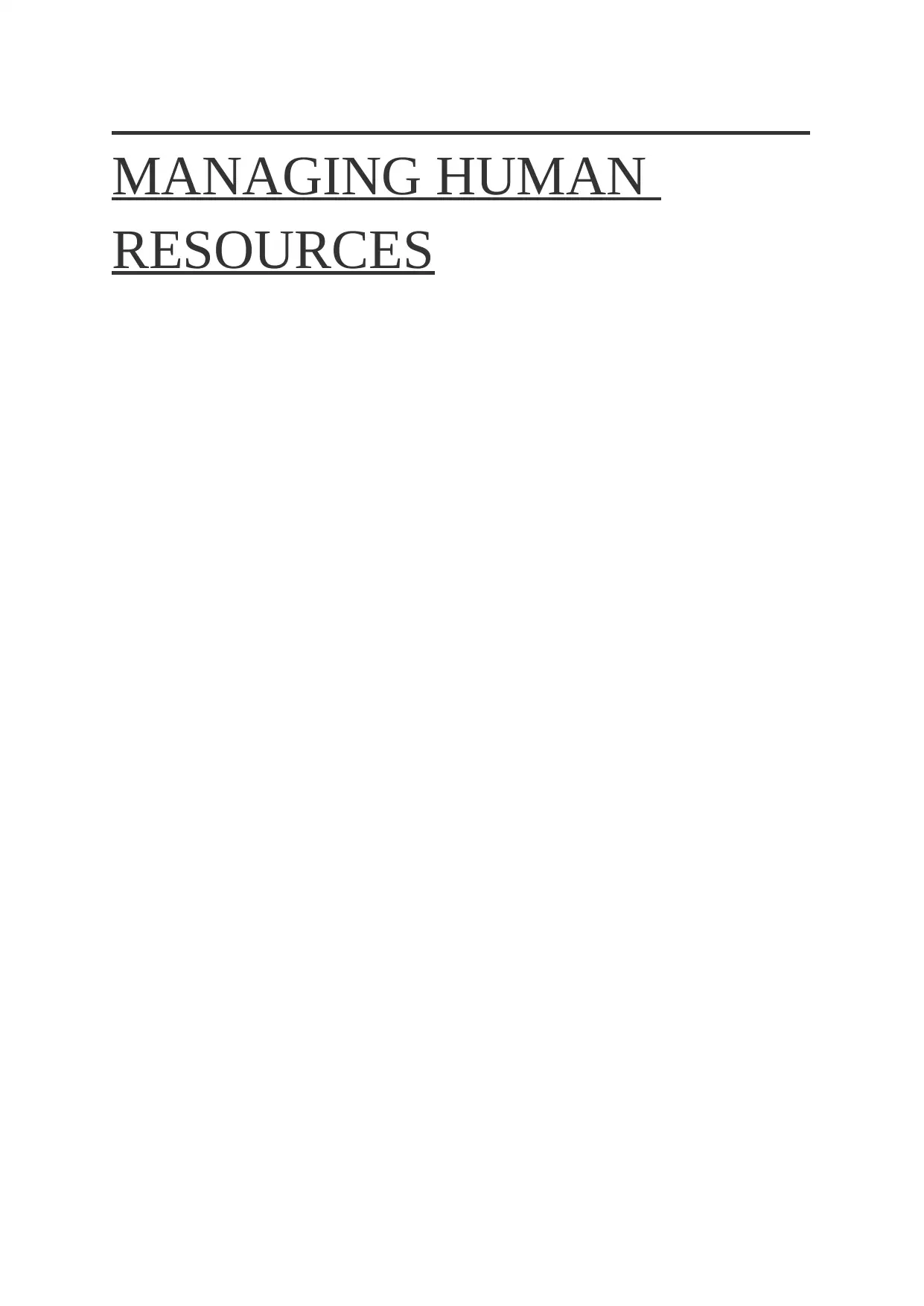
MANAGING HUMAN
RESOURCES
RESOURCES
Paraphrase This Document
Need a fresh take? Get an instant paraphrase of this document with our AI Paraphraser
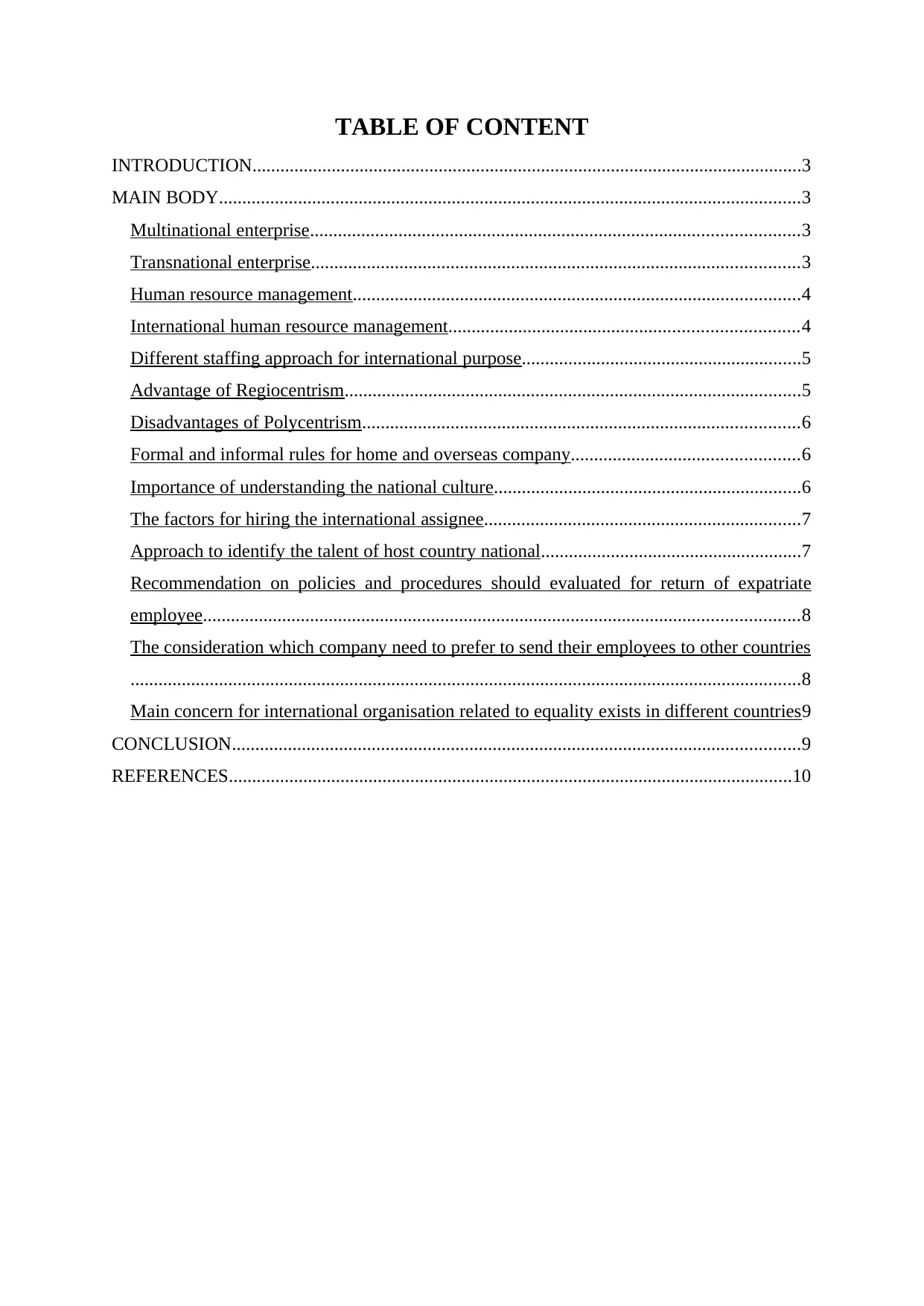
TABLE OF CONTENT
INTRODUCTION......................................................................................................................3
MAIN BODY.............................................................................................................................3
Multinational enterprise.........................................................................................................3
Transnational enterprise.........................................................................................................3
Human resource management................................................................................................4
International human resource management...........................................................................4
Different staffing approach for international purpose............................................................5
Advantage of Regiocentrism..................................................................................................5
Disadvantages of Polycentrism..............................................................................................6
Formal and informal rules for home and overseas company.................................................6
Importance of understanding the national culture..................................................................6
The factors for hiring the international assignee....................................................................7
Approach to identify the talent of host country national........................................................7
Recommendation on policies and procedures should evaluated for return of expatriate
employee................................................................................................................................8
The consideration which company need to prefer to send their employees to other countries
................................................................................................................................................8
Main concern for international organisation related to equality exists in different countries9
CONCLUSION..........................................................................................................................9
REFERENCES.........................................................................................................................10
INTRODUCTION......................................................................................................................3
MAIN BODY.............................................................................................................................3
Multinational enterprise.........................................................................................................3
Transnational enterprise.........................................................................................................3
Human resource management................................................................................................4
International human resource management...........................................................................4
Different staffing approach for international purpose............................................................5
Advantage of Regiocentrism..................................................................................................5
Disadvantages of Polycentrism..............................................................................................6
Formal and informal rules for home and overseas company.................................................6
Importance of understanding the national culture..................................................................6
The factors for hiring the international assignee....................................................................7
Approach to identify the talent of host country national........................................................7
Recommendation on policies and procedures should evaluated for return of expatriate
employee................................................................................................................................8
The consideration which company need to prefer to send their employees to other countries
................................................................................................................................................8
Main concern for international organisation related to equality exists in different countries9
CONCLUSION..........................................................................................................................9
REFERENCES.........................................................................................................................10
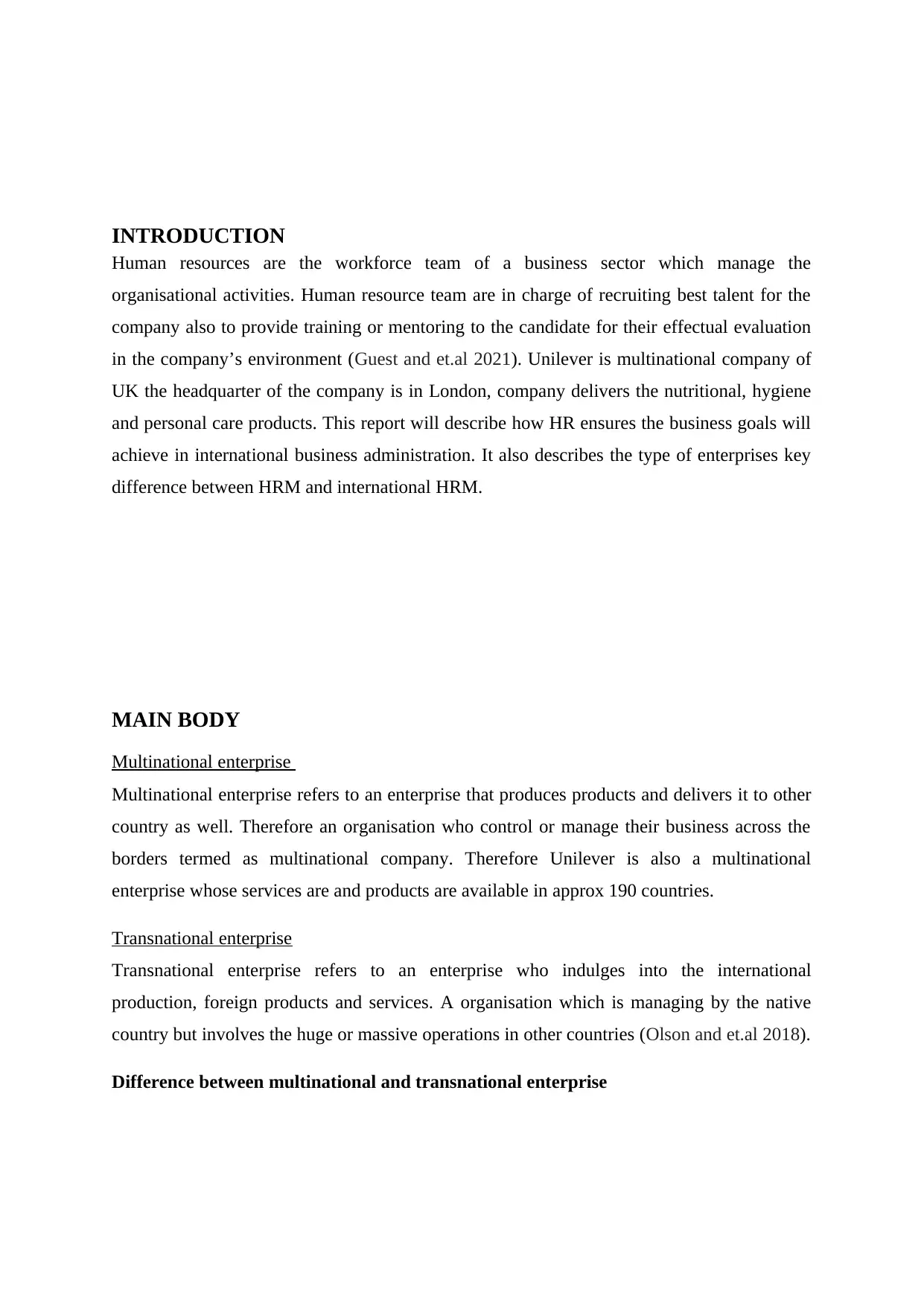
INTRODUCTION
Human resources are the workforce team of a business sector which manage the
organisational activities. Human resource team are in charge of recruiting best talent for the
company also to provide training or mentoring to the candidate for their effectual evaluation
in the company’s environment (Guest and et.al 2021). Unilever is multinational company of
UK the headquarter of the company is in London, company delivers the nutritional, hygiene
and personal care products. This report will describe how HR ensures the business goals will
achieve in international business administration. It also describes the type of enterprises key
difference between HRM and international HRM.
MAIN BODY
Multinational enterprise
Multinational enterprise refers to an enterprise that produces products and delivers it to other
country as well. Therefore an organisation who control or manage their business across the
borders termed as multinational company. Therefore Unilever is also a multinational
enterprise whose services are and products are available in approx 190 countries.
Transnational enterprise
Transnational enterprise refers to an enterprise who indulges into the international
production, foreign products and services. A organisation which is managing by the native
country but involves the huge or massive operations in other countries (Olson and et.al 2018).
Difference between multinational and transnational enterprise
Human resources are the workforce team of a business sector which manage the
organisational activities. Human resource team are in charge of recruiting best talent for the
company also to provide training or mentoring to the candidate for their effectual evaluation
in the company’s environment (Guest and et.al 2021). Unilever is multinational company of
UK the headquarter of the company is in London, company delivers the nutritional, hygiene
and personal care products. This report will describe how HR ensures the business goals will
achieve in international business administration. It also describes the type of enterprises key
difference between HRM and international HRM.
MAIN BODY
Multinational enterprise
Multinational enterprise refers to an enterprise that produces products and delivers it to other
country as well. Therefore an organisation who control or manage their business across the
borders termed as multinational company. Therefore Unilever is also a multinational
enterprise whose services are and products are available in approx 190 countries.
Transnational enterprise
Transnational enterprise refers to an enterprise who indulges into the international
production, foreign products and services. A organisation which is managing by the native
country but involves the huge or massive operations in other countries (Olson and et.al 2018).
Difference between multinational and transnational enterprise
⊘ This is a preview!⊘
Do you want full access?
Subscribe today to unlock all pages.

Trusted by 1+ million students worldwide
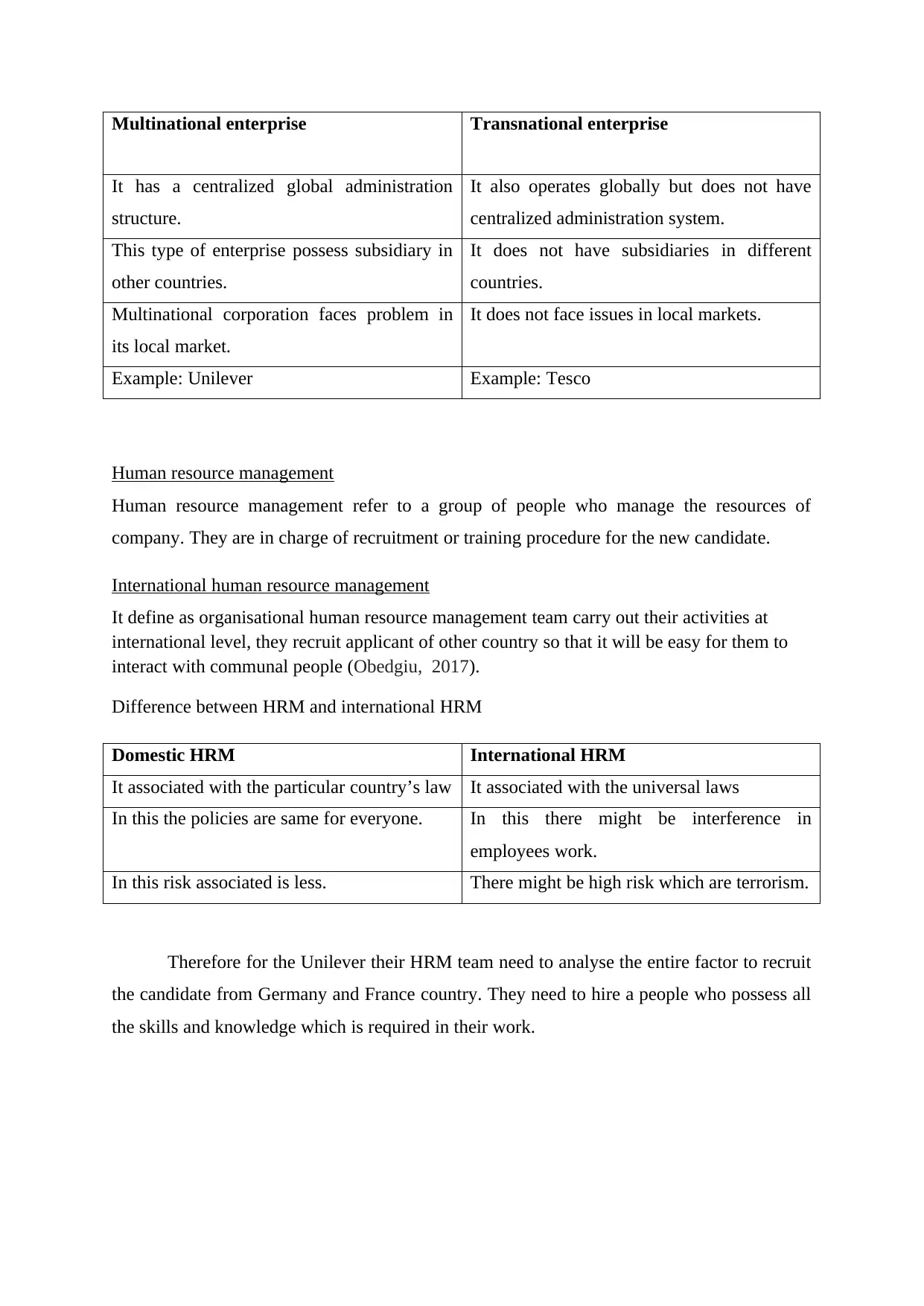
Multinational enterprise Transnational enterprise
It has a centralized global administration
structure.
It also operates globally but does not have
centralized administration system.
This type of enterprise possess subsidiary in
other countries.
It does not have subsidiaries in different
countries.
Multinational corporation faces problem in
its local market.
It does not face issues in local markets.
Example: Unilever Example: Tesco
Human resource management
Human resource management refer to a group of people who manage the resources of
company. They are in charge of recruitment or training procedure for the new candidate.
International human resource management
It define as organisational human resource management team carry out their activities at
international level, they recruit applicant of other country so that it will be easy for them to
interact with communal people (Obedgiu, 2017).
Difference between HRM and international HRM
Domestic HRM International HRM
It associated with the particular country’s law It associated with the universal laws
In this the policies are same for everyone. In this there might be interference in
employees work.
In this risk associated is less. There might be high risk which are terrorism.
Therefore for the Unilever their HRM team need to analyse the entire factor to recruit
the candidate from Germany and France country. They need to hire a people who possess all
the skills and knowledge which is required in their work.
It has a centralized global administration
structure.
It also operates globally but does not have
centralized administration system.
This type of enterprise possess subsidiary in
other countries.
It does not have subsidiaries in different
countries.
Multinational corporation faces problem in
its local market.
It does not face issues in local markets.
Example: Unilever Example: Tesco
Human resource management
Human resource management refer to a group of people who manage the resources of
company. They are in charge of recruitment or training procedure for the new candidate.
International human resource management
It define as organisational human resource management team carry out their activities at
international level, they recruit applicant of other country so that it will be easy for them to
interact with communal people (Obedgiu, 2017).
Difference between HRM and international HRM
Domestic HRM International HRM
It associated with the particular country’s law It associated with the universal laws
In this the policies are same for everyone. In this there might be interference in
employees work.
In this risk associated is less. There might be high risk which are terrorism.
Therefore for the Unilever their HRM team need to analyse the entire factor to recruit
the candidate from Germany and France country. They need to hire a people who possess all
the skills and knowledge which is required in their work.
Paraphrase This Document
Need a fresh take? Get an instant paraphrase of this document with our AI Paraphraser
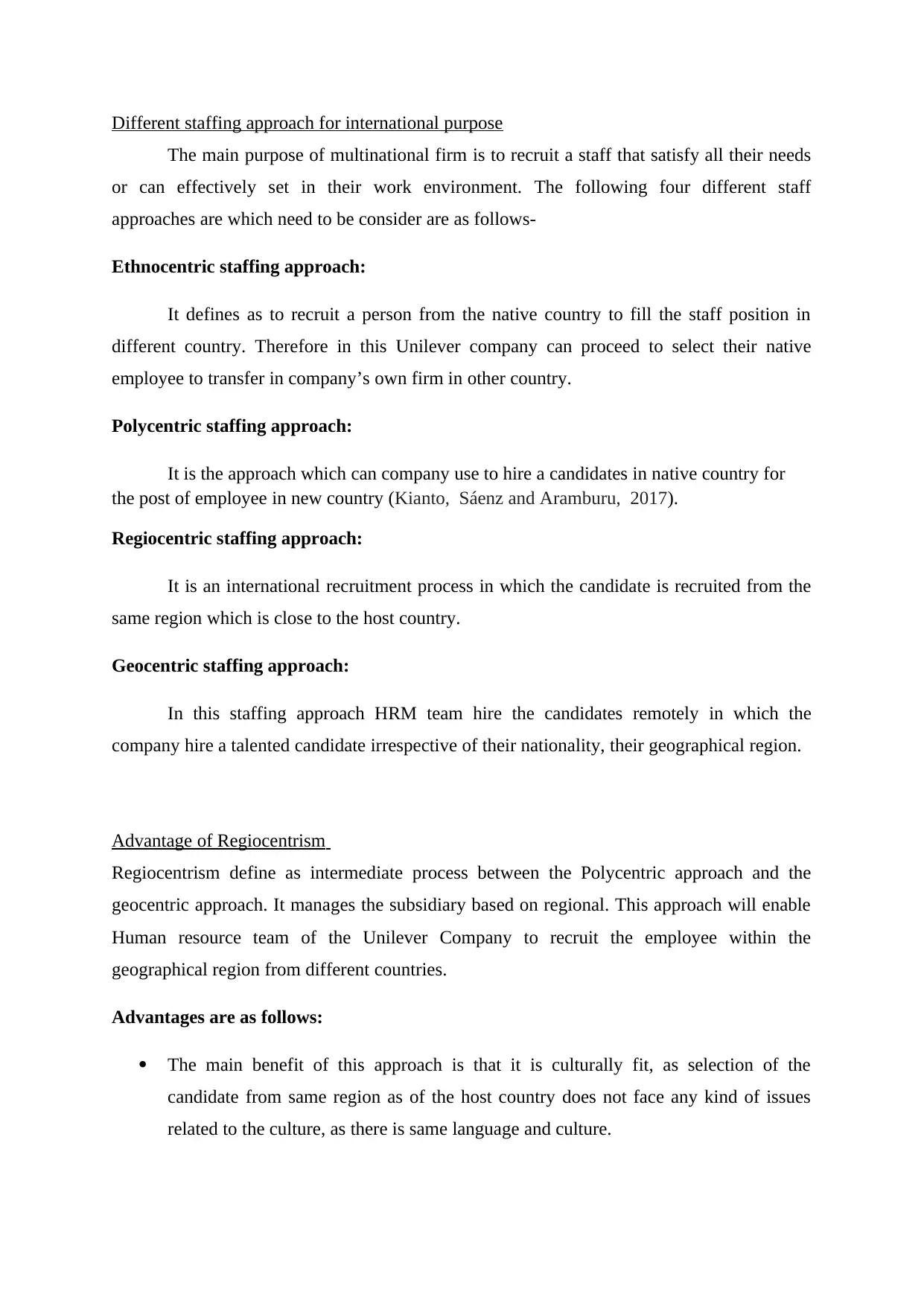
Different staffing approach for international purpose
The main purpose of multinational firm is to recruit a staff that satisfy all their needs
or can effectively set in their work environment. The following four different staff
approaches are which need to be consider are as follows-
Ethnocentric staffing approach:
It defines as to recruit a person from the native country to fill the staff position in
different country. Therefore in this Unilever company can proceed to select their native
employee to transfer in company’s own firm in other country.
Polycentric staffing approach:
It is the approach which can company use to hire a candidates in native country for
the post of employee in new country (Kianto, Sáenz and Aramburu, 2017).
Regiocentric staffing approach:
It is an international recruitment process in which the candidate is recruited from the
same region which is close to the host country.
Geocentric staffing approach:
In this staffing approach HRM team hire the candidates remotely in which the
company hire a talented candidate irrespective of their nationality, their geographical region.
Advantage of Regiocentrism
Regiocentrism define as intermediate process between the Polycentric approach and the
geocentric approach. It manages the subsidiary based on regional. This approach will enable
Human resource team of the Unilever Company to recruit the employee within the
geographical region from different countries.
Advantages are as follows:
The main benefit of this approach is that it is culturally fit, as selection of the
candidate from same region as of the host country does not face any kind of issues
related to the culture, as there is same language and culture.
The main purpose of multinational firm is to recruit a staff that satisfy all their needs
or can effectively set in their work environment. The following four different staff
approaches are which need to be consider are as follows-
Ethnocentric staffing approach:
It defines as to recruit a person from the native country to fill the staff position in
different country. Therefore in this Unilever company can proceed to select their native
employee to transfer in company’s own firm in other country.
Polycentric staffing approach:
It is the approach which can company use to hire a candidates in native country for
the post of employee in new country (Kianto, Sáenz and Aramburu, 2017).
Regiocentric staffing approach:
It is an international recruitment process in which the candidate is recruited from the
same region which is close to the host country.
Geocentric staffing approach:
In this staffing approach HRM team hire the candidates remotely in which the
company hire a talented candidate irrespective of their nationality, their geographical region.
Advantage of Regiocentrism
Regiocentrism define as intermediate process between the Polycentric approach and the
geocentric approach. It manages the subsidiary based on regional. This approach will enable
Human resource team of the Unilever Company to recruit the employee within the
geographical region from different countries.
Advantages are as follows:
The main benefit of this approach is that it is culturally fit, as selection of the
candidate from same region as of the host country does not face any kind of issues
related to the culture, as there is same language and culture.
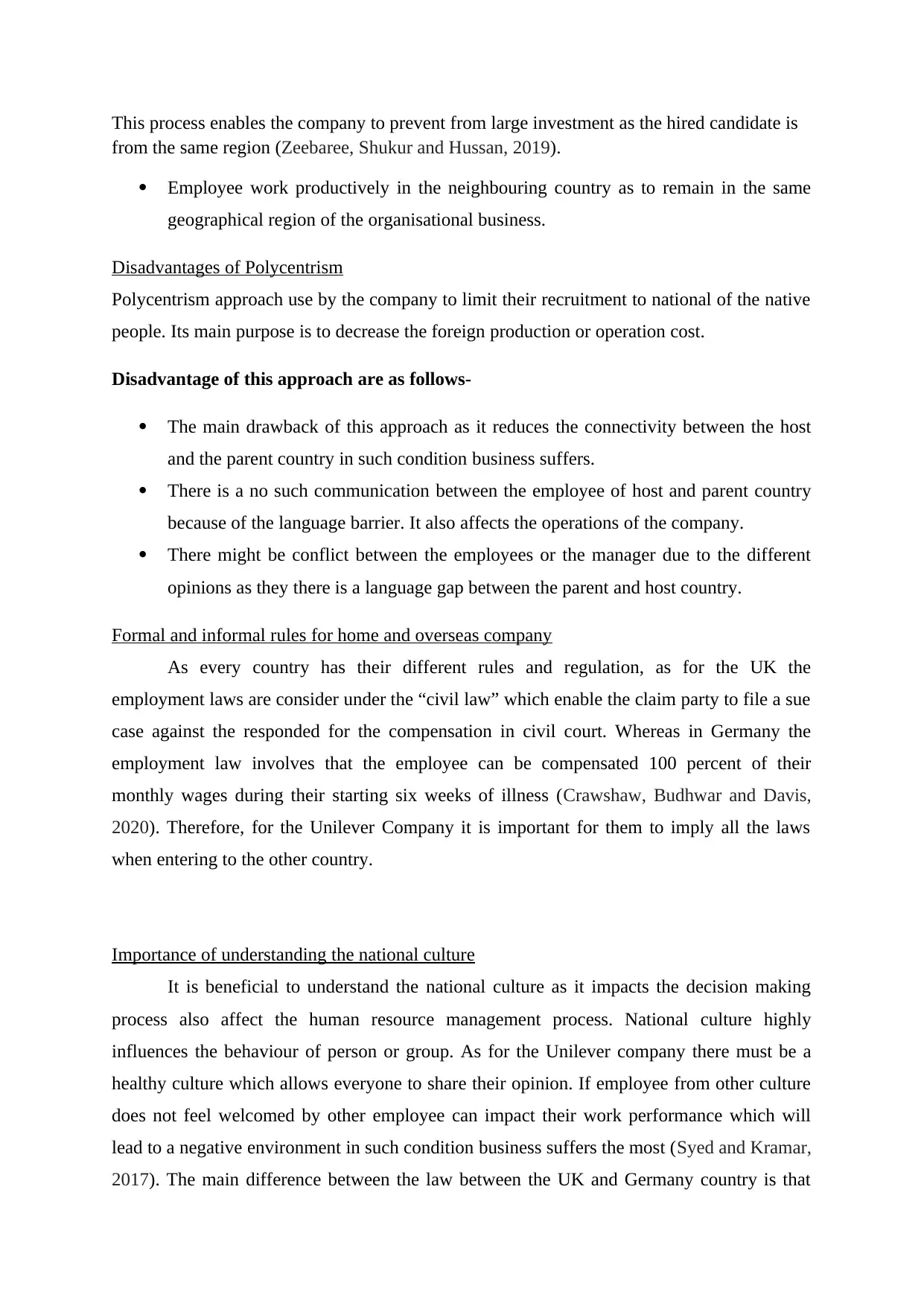
This process enables the company to prevent from large investment as the hired candidate is
from the same region (Zeebaree, Shukur and Hussan, 2019).
Employee work productively in the neighbouring country as to remain in the same
geographical region of the organisational business.
Disadvantages of Polycentrism
Polycentrism approach use by the company to limit their recruitment to national of the native
people. Its main purpose is to decrease the foreign production or operation cost.
Disadvantage of this approach are as follows-
The main drawback of this approach as it reduces the connectivity between the host
and the parent country in such condition business suffers.
There is a no such communication between the employee of host and parent country
because of the language barrier. It also affects the operations of the company.
There might be conflict between the employees or the manager due to the different
opinions as they there is a language gap between the parent and host country.
Formal and informal rules for home and overseas company
As every country has their different rules and regulation, as for the UK the
employment laws are consider under the “civil law” which enable the claim party to file a sue
case against the responded for the compensation in civil court. Whereas in Germany the
employment law involves that the employee can be compensated 100 percent of their
monthly wages during their starting six weeks of illness (Crawshaw, Budhwar and Davis,
2020). Therefore, for the Unilever Company it is important for them to imply all the laws
when entering to the other country.
Importance of understanding the national culture
It is beneficial to understand the national culture as it impacts the decision making
process also affect the human resource management process. National culture highly
influences the behaviour of person or group. As for the Unilever company there must be a
healthy culture which allows everyone to share their opinion. If employee from other culture
does not feel welcomed by other employee can impact their work performance which will
lead to a negative environment in such condition business suffers the most (Syed and Kramar,
2017). The main difference between the law between the UK and Germany country is that
from the same region (Zeebaree, Shukur and Hussan, 2019).
Employee work productively in the neighbouring country as to remain in the same
geographical region of the organisational business.
Disadvantages of Polycentrism
Polycentrism approach use by the company to limit their recruitment to national of the native
people. Its main purpose is to decrease the foreign production or operation cost.
Disadvantage of this approach are as follows-
The main drawback of this approach as it reduces the connectivity between the host
and the parent country in such condition business suffers.
There is a no such communication between the employee of host and parent country
because of the language barrier. It also affects the operations of the company.
There might be conflict between the employees or the manager due to the different
opinions as they there is a language gap between the parent and host country.
Formal and informal rules for home and overseas company
As every country has their different rules and regulation, as for the UK the
employment laws are consider under the “civil law” which enable the claim party to file a sue
case against the responded for the compensation in civil court. Whereas in Germany the
employment law involves that the employee can be compensated 100 percent of their
monthly wages during their starting six weeks of illness (Crawshaw, Budhwar and Davis,
2020). Therefore, for the Unilever Company it is important for them to imply all the laws
when entering to the other country.
Importance of understanding the national culture
It is beneficial to understand the national culture as it impacts the decision making
process also affect the human resource management process. National culture highly
influences the behaviour of person or group. As for the Unilever company there must be a
healthy culture which allows everyone to share their opinion. If employee from other culture
does not feel welcomed by other employee can impact their work performance which will
lead to a negative environment in such condition business suffers the most (Syed and Kramar,
2017). The main difference between the law between the UK and Germany country is that
⊘ This is a preview!⊘
Do you want full access?
Subscribe today to unlock all pages.

Trusted by 1+ million students worldwide
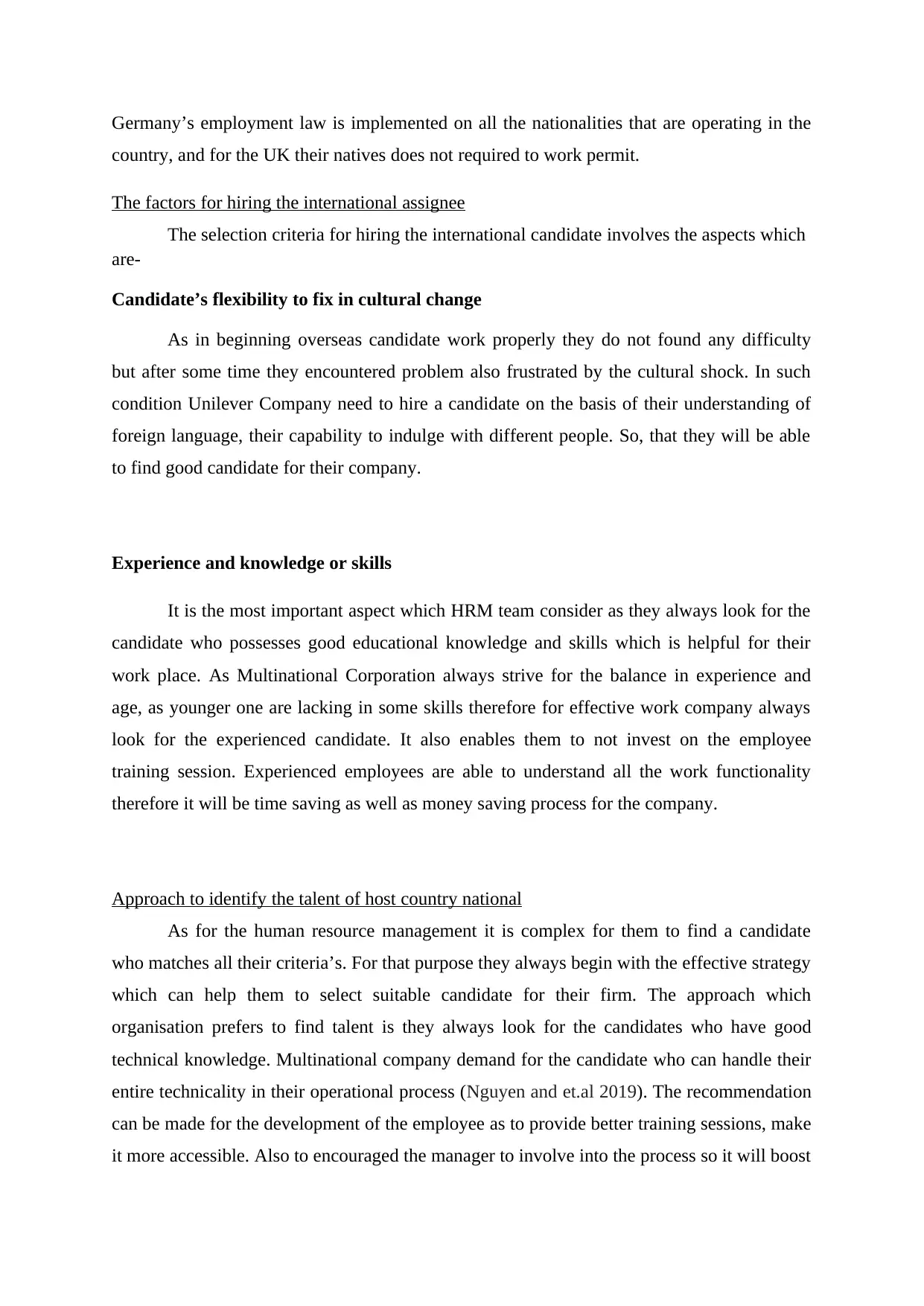
Germany’s employment law is implemented on all the nationalities that are operating in the
country, and for the UK their natives does not required to work permit.
The factors for hiring the international assignee
The selection criteria for hiring the international candidate involves the aspects which
are-
Candidate’s flexibility to fix in cultural change
As in beginning overseas candidate work properly they do not found any difficulty
but after some time they encountered problem also frustrated by the cultural shock. In such
condition Unilever Company need to hire a candidate on the basis of their understanding of
foreign language, their capability to indulge with different people. So, that they will be able
to find good candidate for their company.
Experience and knowledge or skills
It is the most important aspect which HRM team consider as they always look for the
candidate who possesses good educational knowledge and skills which is helpful for their
work place. As Multinational Corporation always strive for the balance in experience and
age, as younger one are lacking in some skills therefore for effective work company always
look for the experienced candidate. It also enables them to not invest on the employee
training session. Experienced employees are able to understand all the work functionality
therefore it will be time saving as well as money saving process for the company.
Approach to identify the talent of host country national
As for the human resource management it is complex for them to find a candidate
who matches all their criteria’s. For that purpose they always begin with the effective strategy
which can help them to select suitable candidate for their firm. The approach which
organisation prefers to find talent is they always look for the candidates who have good
technical knowledge. Multinational company demand for the candidate who can handle their
entire technicality in their operational process (Nguyen and et.al 2019). The recommendation
can be made for the development of the employee as to provide better training sessions, make
it more accessible. Also to encouraged the manager to involve into the process so it will boost
country, and for the UK their natives does not required to work permit.
The factors for hiring the international assignee
The selection criteria for hiring the international candidate involves the aspects which
are-
Candidate’s flexibility to fix in cultural change
As in beginning overseas candidate work properly they do not found any difficulty
but after some time they encountered problem also frustrated by the cultural shock. In such
condition Unilever Company need to hire a candidate on the basis of their understanding of
foreign language, their capability to indulge with different people. So, that they will be able
to find good candidate for their company.
Experience and knowledge or skills
It is the most important aspect which HRM team consider as they always look for the
candidate who possesses good educational knowledge and skills which is helpful for their
work place. As Multinational Corporation always strive for the balance in experience and
age, as younger one are lacking in some skills therefore for effective work company always
look for the experienced candidate. It also enables them to not invest on the employee
training session. Experienced employees are able to understand all the work functionality
therefore it will be time saving as well as money saving process for the company.
Approach to identify the talent of host country national
As for the human resource management it is complex for them to find a candidate
who matches all their criteria’s. For that purpose they always begin with the effective strategy
which can help them to select suitable candidate for their firm. The approach which
organisation prefers to find talent is they always look for the candidates who have good
technical knowledge. Multinational company demand for the candidate who can handle their
entire technicality in their operational process (Nguyen and et.al 2019). The recommendation
can be made for the development of the employee as to provide better training sessions, make
it more accessible. Also to encouraged the manager to involve into the process so it will boost
Paraphrase This Document
Need a fresh take? Get an instant paraphrase of this document with our AI Paraphraser
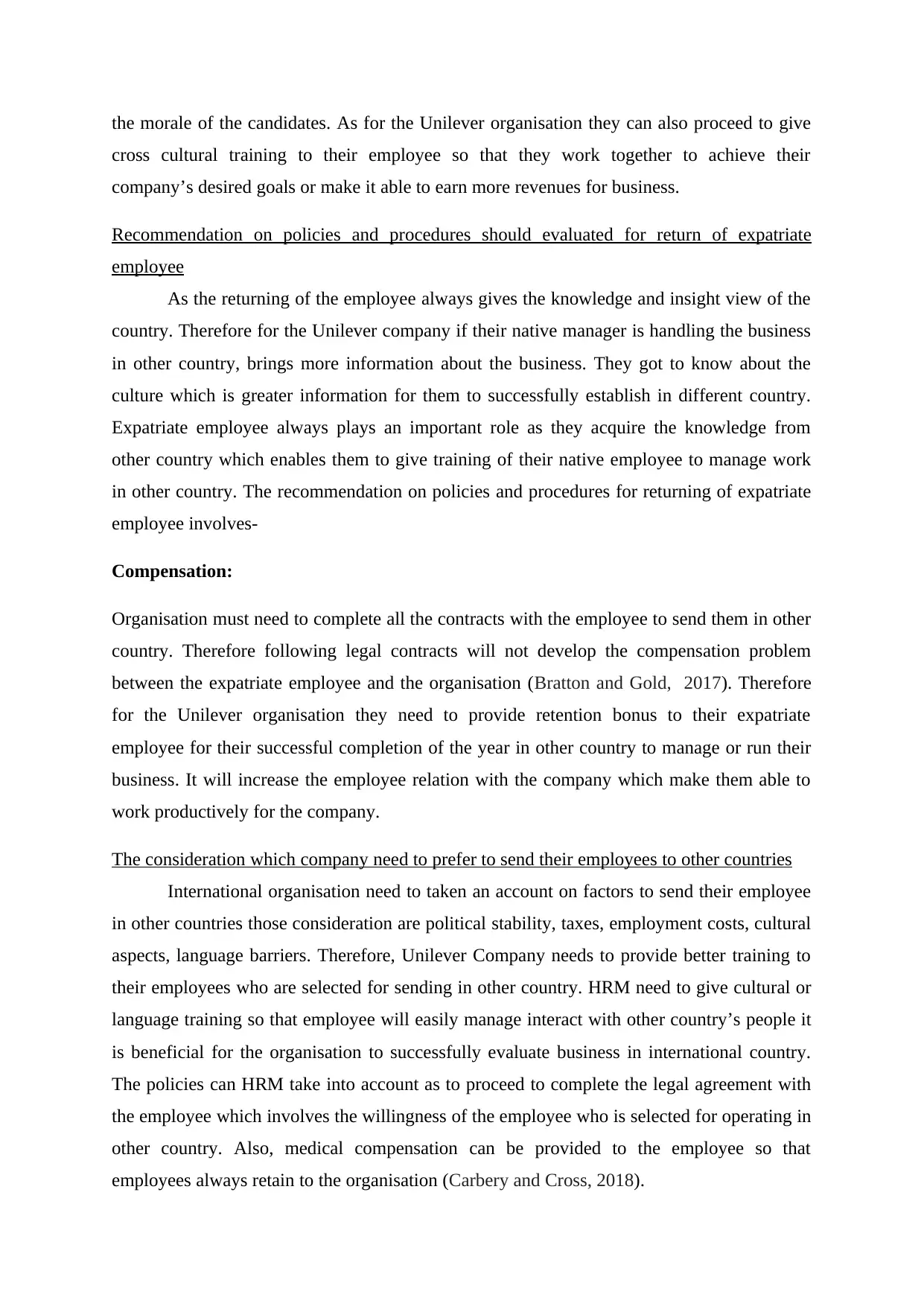
the morale of the candidates. As for the Unilever organisation they can also proceed to give
cross cultural training to their employee so that they work together to achieve their
company’s desired goals or make it able to earn more revenues for business.
Recommendation on policies and procedures should evaluated for return of expatriate
employee
As the returning of the employee always gives the knowledge and insight view of the
country. Therefore for the Unilever company if their native manager is handling the business
in other country, brings more information about the business. They got to know about the
culture which is greater information for them to successfully establish in different country.
Expatriate employee always plays an important role as they acquire the knowledge from
other country which enables them to give training of their native employee to manage work
in other country. The recommendation on policies and procedures for returning of expatriate
employee involves-
Compensation:
Organisation must need to complete all the contracts with the employee to send them in other
country. Therefore following legal contracts will not develop the compensation problem
between the expatriate employee and the organisation (Bratton and Gold, 2017). Therefore
for the Unilever organisation they need to provide retention bonus to their expatriate
employee for their successful completion of the year in other country to manage or run their
business. It will increase the employee relation with the company which make them able to
work productively for the company.
The consideration which company need to prefer to send their employees to other countries
International organisation need to taken an account on factors to send their employee
in other countries those consideration are political stability, taxes, employment costs, cultural
aspects, language barriers. Therefore, Unilever Company needs to provide better training to
their employees who are selected for sending in other country. HRM need to give cultural or
language training so that employee will easily manage interact with other country’s people it
is beneficial for the organisation to successfully evaluate business in international country.
The policies can HRM take into account as to proceed to complete the legal agreement with
the employee which involves the willingness of the employee who is selected for operating in
other country. Also, medical compensation can be provided to the employee so that
employees always retain to the organisation (Carbery and Cross, 2018).
cross cultural training to their employee so that they work together to achieve their
company’s desired goals or make it able to earn more revenues for business.
Recommendation on policies and procedures should evaluated for return of expatriate
employee
As the returning of the employee always gives the knowledge and insight view of the
country. Therefore for the Unilever company if their native manager is handling the business
in other country, brings more information about the business. They got to know about the
culture which is greater information for them to successfully establish in different country.
Expatriate employee always plays an important role as they acquire the knowledge from
other country which enables them to give training of their native employee to manage work
in other country. The recommendation on policies and procedures for returning of expatriate
employee involves-
Compensation:
Organisation must need to complete all the contracts with the employee to send them in other
country. Therefore following legal contracts will not develop the compensation problem
between the expatriate employee and the organisation (Bratton and Gold, 2017). Therefore
for the Unilever organisation they need to provide retention bonus to their expatriate
employee for their successful completion of the year in other country to manage or run their
business. It will increase the employee relation with the company which make them able to
work productively for the company.
The consideration which company need to prefer to send their employees to other countries
International organisation need to taken an account on factors to send their employee
in other countries those consideration are political stability, taxes, employment costs, cultural
aspects, language barriers. Therefore, Unilever Company needs to provide better training to
their employees who are selected for sending in other country. HRM need to give cultural or
language training so that employee will easily manage interact with other country’s people it
is beneficial for the organisation to successfully evaluate business in international country.
The policies can HRM take into account as to proceed to complete the legal agreement with
the employee which involves the willingness of the employee who is selected for operating in
other country. Also, medical compensation can be provided to the employee so that
employees always retain to the organisation (Carbery and Cross, 2018).
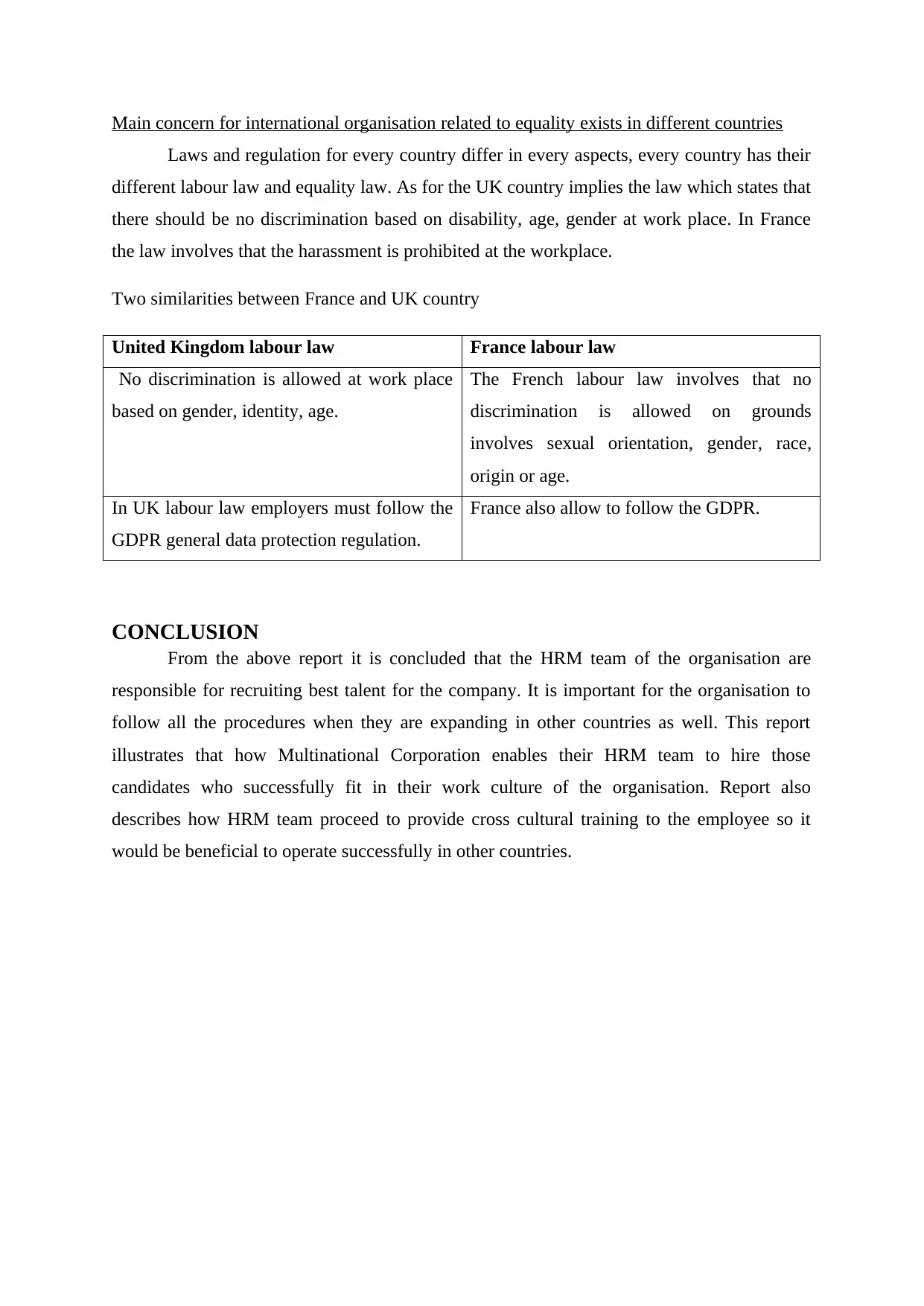
Main concern for international organisation related to equality exists in different countries
Laws and regulation for every country differ in every aspects, every country has their
different labour law and equality law. As for the UK country implies the law which states that
there should be no discrimination based on disability, age, gender at work place. In France
the law involves that the harassment is prohibited at the workplace.
Two similarities between France and UK country
United Kingdom labour law France labour law
No discrimination is allowed at work place
based on gender, identity, age.
The French labour law involves that no
discrimination is allowed on grounds
involves sexual orientation, gender, race,
origin or age.
In UK labour law employers must follow the
GDPR general data protection regulation.
France also allow to follow the GDPR.
CONCLUSION
From the above report it is concluded that the HRM team of the organisation are
responsible for recruiting best talent for the company. It is important for the organisation to
follow all the procedures when they are expanding in other countries as well. This report
illustrates that how Multinational Corporation enables their HRM team to hire those
candidates who successfully fit in their work culture of the organisation. Report also
describes how HRM team proceed to provide cross cultural training to the employee so it
would be beneficial to operate successfully in other countries.
Laws and regulation for every country differ in every aspects, every country has their
different labour law and equality law. As for the UK country implies the law which states that
there should be no discrimination based on disability, age, gender at work place. In France
the law involves that the harassment is prohibited at the workplace.
Two similarities between France and UK country
United Kingdom labour law France labour law
No discrimination is allowed at work place
based on gender, identity, age.
The French labour law involves that no
discrimination is allowed on grounds
involves sexual orientation, gender, race,
origin or age.
In UK labour law employers must follow the
GDPR general data protection regulation.
France also allow to follow the GDPR.
CONCLUSION
From the above report it is concluded that the HRM team of the organisation are
responsible for recruiting best talent for the company. It is important for the organisation to
follow all the procedures when they are expanding in other countries as well. This report
illustrates that how Multinational Corporation enables their HRM team to hire those
candidates who successfully fit in their work culture of the organisation. Report also
describes how HRM team proceed to provide cross cultural training to the employee so it
would be beneficial to operate successfully in other countries.
⊘ This is a preview!⊘
Do you want full access?
Subscribe today to unlock all pages.

Trusted by 1+ million students worldwide
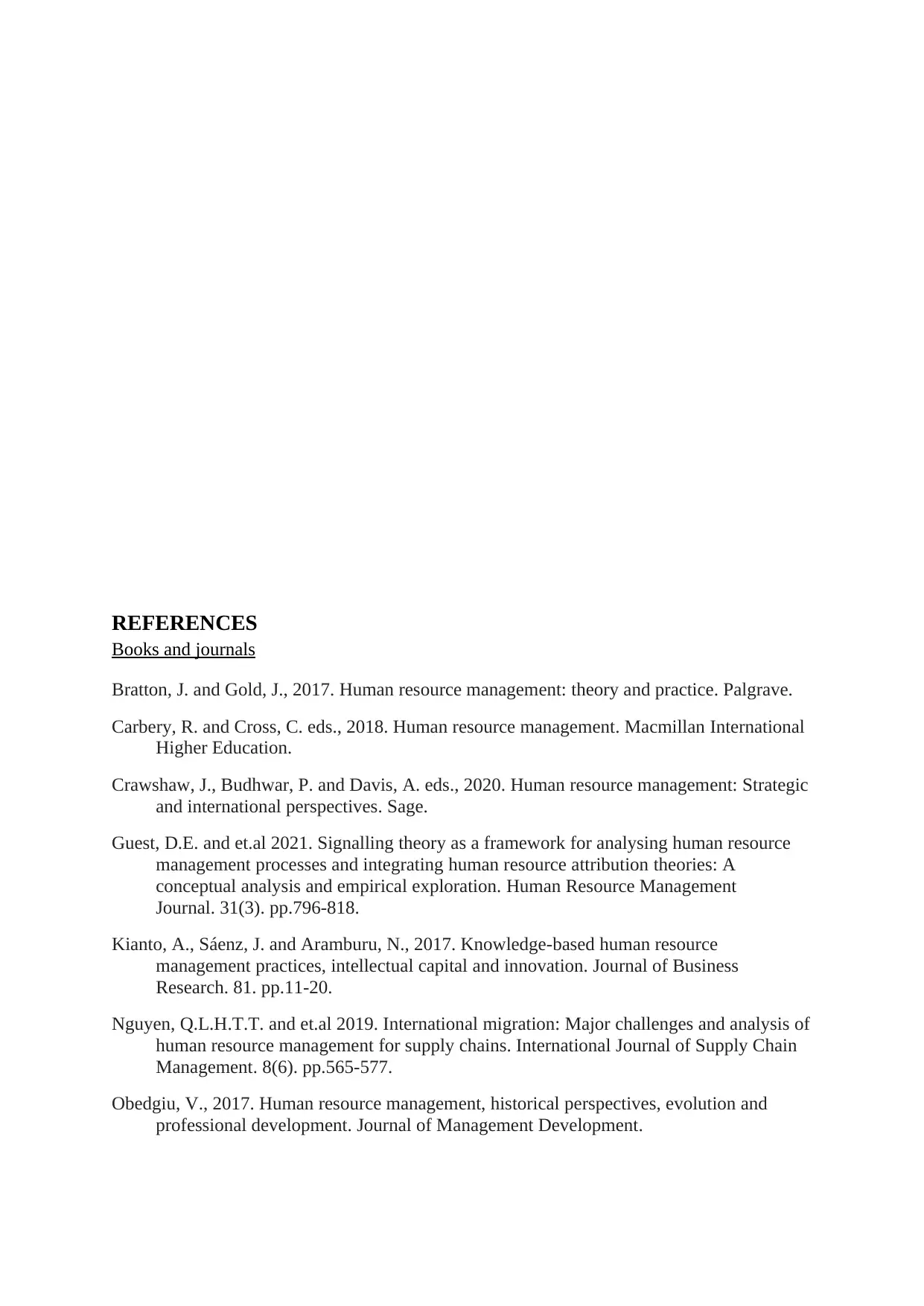
REFERENCES
Books and journals
Bratton, J. and Gold, J., 2017. Human resource management: theory and practice. Palgrave.
Carbery, R. and Cross, C. eds., 2018. Human resource management. Macmillan International
Higher Education.
Crawshaw, J., Budhwar, P. and Davis, A. eds., 2020. Human resource management: Strategic
and international perspectives. Sage.
Guest, D.E. and et.al 2021. Signalling theory as a framework for analysing human resource
management processes and integrating human resource attribution theories: A
conceptual analysis and empirical exploration. Human Resource Management
Journal. 31(3). pp.796-818.
Kianto, A., Sáenz, J. and Aramburu, N., 2017. Knowledge-based human resource
management practices, intellectual capital and innovation. Journal of Business
Research. 81. pp.11-20.
Nguyen, Q.L.H.T.T. and et.al 2019. International migration: Major challenges and analysis of
human resource management for supply chains. International Journal of Supply Chain
Management. 8(6). pp.565-577.
Obedgiu, V., 2017. Human resource management, historical perspectives, evolution and
professional development. Journal of Management Development.
Books and journals
Bratton, J. and Gold, J., 2017. Human resource management: theory and practice. Palgrave.
Carbery, R. and Cross, C. eds., 2018. Human resource management. Macmillan International
Higher Education.
Crawshaw, J., Budhwar, P. and Davis, A. eds., 2020. Human resource management: Strategic
and international perspectives. Sage.
Guest, D.E. and et.al 2021. Signalling theory as a framework for analysing human resource
management processes and integrating human resource attribution theories: A
conceptual analysis and empirical exploration. Human Resource Management
Journal. 31(3). pp.796-818.
Kianto, A., Sáenz, J. and Aramburu, N., 2017. Knowledge-based human resource
management practices, intellectual capital and innovation. Journal of Business
Research. 81. pp.11-20.
Nguyen, Q.L.H.T.T. and et.al 2019. International migration: Major challenges and analysis of
human resource management for supply chains. International Journal of Supply Chain
Management. 8(6). pp.565-577.
Obedgiu, V., 2017. Human resource management, historical perspectives, evolution and
professional development. Journal of Management Development.
Paraphrase This Document
Need a fresh take? Get an instant paraphrase of this document with our AI Paraphraser
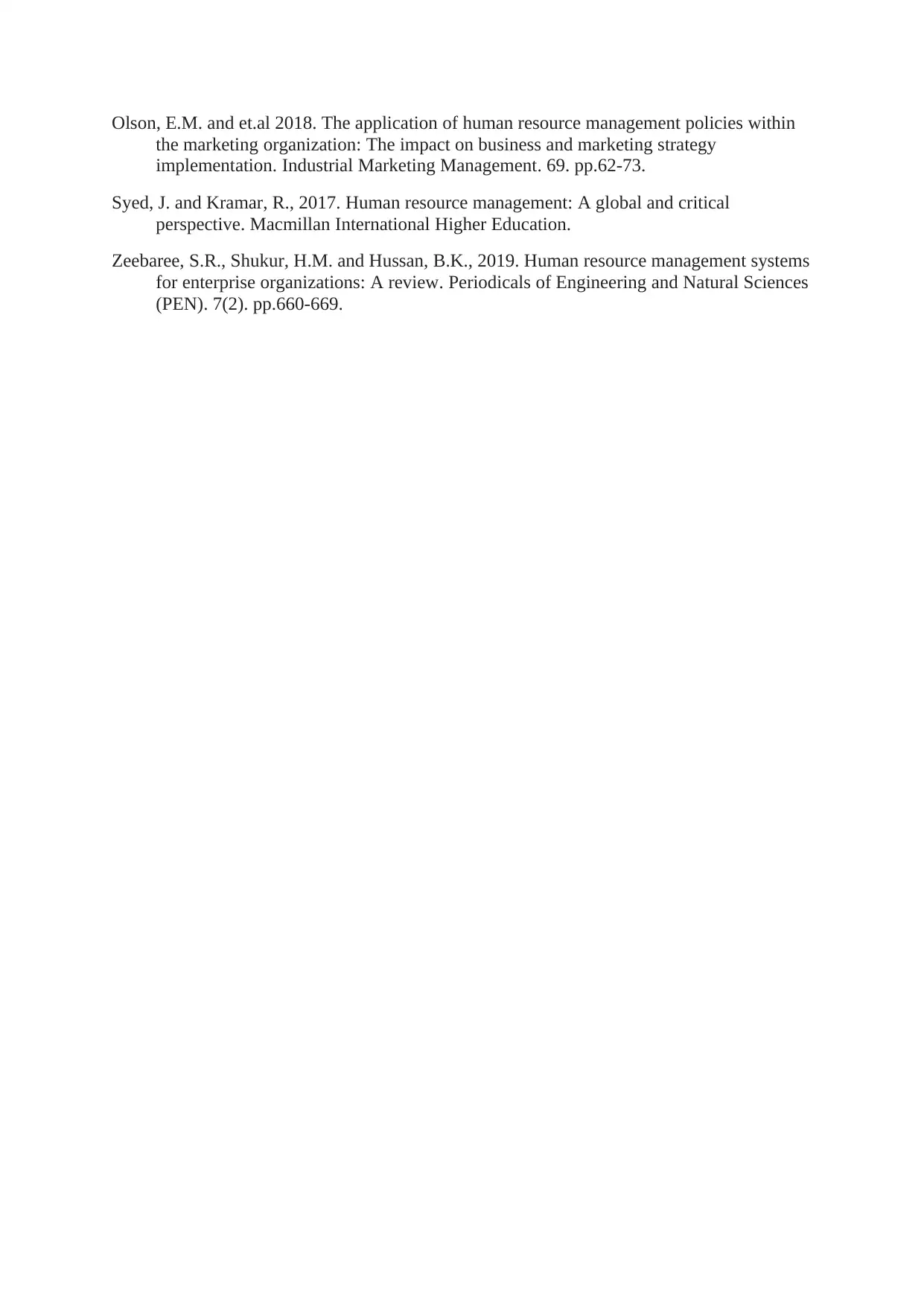
Olson, E.M. and et.al 2018. The application of human resource management policies within
the marketing organization: The impact on business and marketing strategy
implementation. Industrial Marketing Management. 69. pp.62-73.
Syed, J. and Kramar, R., 2017. Human resource management: A global and critical
perspective. Macmillan International Higher Education.
Zeebaree, S.R., Shukur, H.M. and Hussan, B.K., 2019. Human resource management systems
for enterprise organizations: A review. Periodicals of Engineering and Natural Sciences
(PEN). 7(2). pp.660-669.
the marketing organization: The impact on business and marketing strategy
implementation. Industrial Marketing Management. 69. pp.62-73.
Syed, J. and Kramar, R., 2017. Human resource management: A global and critical
perspective. Macmillan International Higher Education.
Zeebaree, S.R., Shukur, H.M. and Hussan, B.K., 2019. Human resource management systems
for enterprise organizations: A review. Periodicals of Engineering and Natural Sciences
(PEN). 7(2). pp.660-669.
1 out of 11
Related Documents
Your All-in-One AI-Powered Toolkit for Academic Success.
+13062052269
info@desklib.com
Available 24*7 on WhatsApp / Email
![[object Object]](/_next/static/media/star-bottom.7253800d.svg)
Unlock your academic potential
Copyright © 2020–2026 A2Z Services. All Rights Reserved. Developed and managed by ZUCOL.



